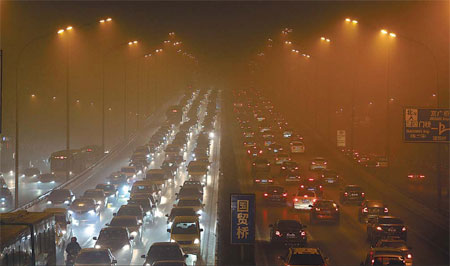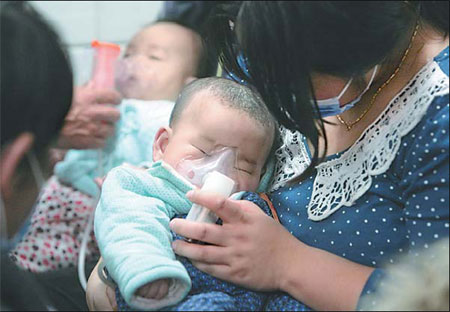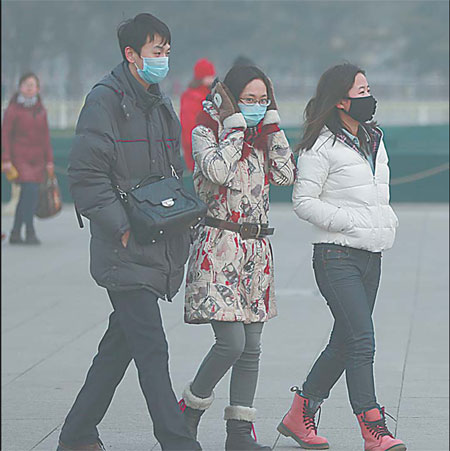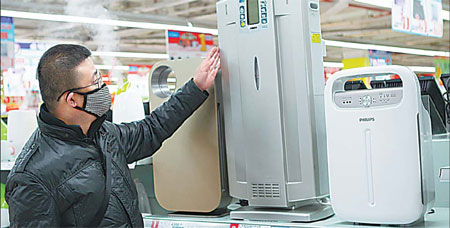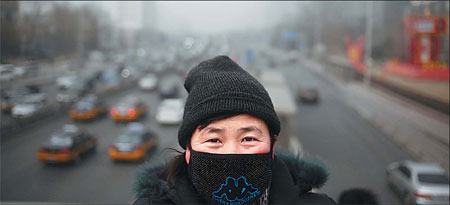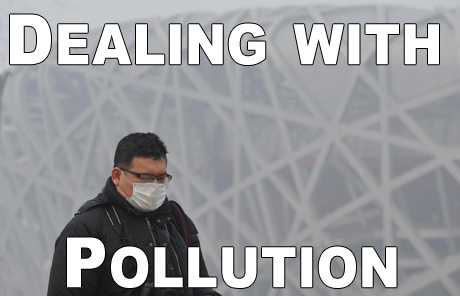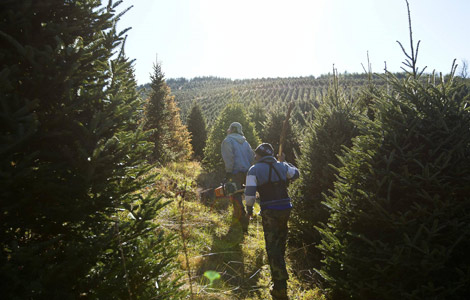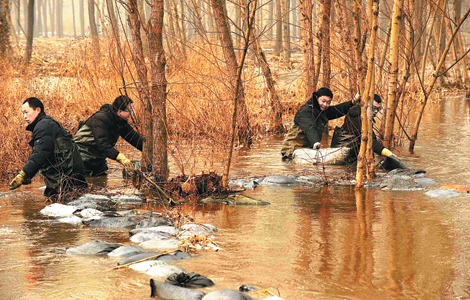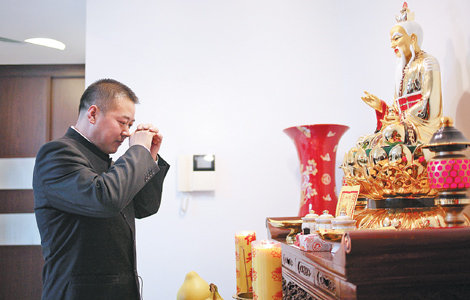Healthy debate over air
Updated: 2013-01-14 07:55
By Wu Wencong, Tang Yue and Cui Jia (China Daily)
|
||||||||
|
The capital's Third Ring Road is shrouded in haze on Saturday as the city's air pollution reached hazardous levels. Jason Lee / Reuters |
|
Beijing hospitals reported a rise in the number of young patients seen for respiratory complaints over the weekend. Wang Hejian / for China Daily |
|
Visitors to Tian'anmen Square wearing face masks as protection against the heavy pollution. Feng Yongbin / China Daily |
|
A man examines an air purifier in Beijing. During the weekend the capital and other cities in the Beijing-Tianjin-Hebei region were hit by severe air pollution. Zou Hong / China Daily |
|
Beijing saw PM2.5 density climb higher than 900 micrograms per cubic meter on Saturday. The World Health Organization considers 25 micrograms per cu m to be a safe daily level. Wang Jing / China Daily |
Record pollution levels hit transport as face mask sales surge, report Wu Wencong, Tang Yue and Cui Jia.
For many years, Peking Duck and Peking Opera were probably the two most famous items named after the capital.
However, they now face a strong challenge. The heavy smog and haze that enveloped the city on the weekend - pushing the pollution index to a record high - has seen "Beijing Cough", a term coined by the city's expat community, becoming increasingly popular with local media and Chinese citizens.
Saturday saw the density of PM2.5 - air particles smaller than 2.5 microns and able to enter the lungs and even the blood stream - climb higher than 900 micrograms per cubic meter in several districts in the capital, according to the Beijing Municipal Environmental Monitoring Center. That's the highest level recorded since Beijing began publishing the data in early 2012.
The World Health Organization considers the safe daily level to be 25 micrograms per cubic meter.
However, the problem has now become a national phenomenon, rather than one unique to Beijing. On Saturday, levels of PM2.5 passed 300 micrograms per cubic meter in 33 of the 74 cities with systems equipped to monitor the particles.
The heavy smog saw at least 25 international and domestic flights to and from Beijing Capital International Airport cancelled by Sunday morning. Many highways were closed in Shandong and Jiangxi provinces, and the poor visibility resulted in a number of collisions on Sunday morning, claiming one life in Shaoyang, Hunan province.
China will have to endure this hazardous weather until Jan 16, when cold fronts move into the central and eastern parts of the country, according to Ma Xuekuan, chief weather forecaster at the National Meteorological Center, on Sunday.
Face masks
"If he hadn't had a fever today, I wouldn't have brought him to the hospital. I'm afraid the pollution will only make his cough worse," said the mother of a 7-year-old boy being treated at the China-Japan Friendship Hospital on Sunday. Parents and children at the hospital wore face masks.
"It only takes me 10 minutes to cycle to work, but when I get home my mask is gray and filthy. It's just terrible," she said.
Hospitals in Beijing and in the provinces of Hebei and Hubei have reported a rise in the number of patients with respiratory conditions during recent days, according to local media.
In 2012, an estimated 8,572 premature deaths occurred in Shanghai, Guangzhou, Xi'an and Beijing. They were a direct result of high levels of PM2.5, according to a report co-authored by Peking University's School of Public Health and Greenpeace. Meanwhile, the World Health Organization estimates that air pollution caused approximately 470,000 premature deaths in 2008.
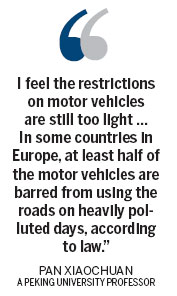
Continuous, large-scale pollution in the form of smog will create panic among the public and cause people to question the government's handling of environmental issues, according to the China Council for International Cooperation on Environment and Development.
The growth and severity of PM2.5 pollution in recent years is directly related to the rapid rise in coal consumption, allied to an increase in vehicle exhaust emissions. Although cities such as Beijing and Guangzhou are leading the way in the reduction of coal use in absolute terms, air pollution naturally moves with the air currents, meaning some cities share each other's polluted air. The Ministry of Environmental Protection is encouraging places such as the Beijing-Tianjin-Hebei region, the Yangtze River Delta and the Pearl River Delta to unite to combat pollution.
Since the start of the month, 74 large cities in China have provided daily readings of PM2.5 that are available to the public. As the data becomes more widely available, China is working on a national surveillance and risk-assessment network on the health impact of PM2.5, said Xu Dongqun, deputy director of the institute of environmental health and related product safety at the Chinese Center for Disease Control and Prevention.
"The planned network, the first of its kind on the mainland, will study the exact links between major pollutants, particularly PM2.5 and help the authorities to issue public health warnings ahead of the worst days whenever possible," she said.
By studying data from air-quality monitoring stations and records of hospital visits, plus medical and mortality records, the system will provide specific warnings and advice to help the public to protect themselves, explained Xu, although she was unable to provide an exact timetable.
The network will start in Beijing, before being rolled out nationwide as the air-quality monitoring data become more widely available across the mainland, she said. "The health impact of the fine particulates varies regionally and among differing population groups."
Red light spells danger
"My friends and I have started to make jokes along the lines of 'Right now, it's healthier to smoke in Beijing than to breathe the air,'" said Camille Chanlair, a French national who has lived in the city since 2008. "They all avoid going out when they see the pollution. Some have bought air purifiers," he added.
"This is no joke, people! This is serious stuff. You should not be outside right now with your children. Everyone should be taking it easy and avoid going outside," wrote Richard Saint Cyr, a general practitioner at a private hospital in Beijing, in a warning posted on his micro blog before he left work on Saturday evening.
Saint Cyr, who has lived in China for six years, said his clinic has a good air filter system. His 200-square-meter home is also equipped with three air purifiers. "Honestly, with this high level (of pollution) even three purifiers won't really be effective. But at least I can close my bedroom door overnight," said the US national.
Zhang Bo, general manager of Beijing Jijian Science & Technology Development Co, said the three air purifiers at his home in Beijing are so overloaded that the red lights (indicating heavy pollution) can't be disarmed.
"It usually takes each machine an average of one hour to purify the air (in one room). When that's done, the red light turns green. Now, it stays red all the time," he said, adding that the pollution is so bad that he won't venture out of doors if he can avoid it.
Saint Cyr said he has seen an unusually high number of people arriving at the clinic complaining of bad coughs and breathing and pulmonary problems. Most feel better after being treated with cough syrup, but the doctor emphasized that the best treatment is to avoid exposure to the pollutants.
"At these levels, people of all ages should really avoid going outside, if possible. These types of pollution spikes can be deadly for very sick and fragile people who are already weak from illness. Anyone with a normal cold or flu will find it much harder to recover quickly in this polluted atmosphere," he said.
He recommended N95 filter respirators, a type of mask designed to combat PM2.5 and intended for those with no alternative to going outdoors. "They definitely stop PM2.5. The definition of N95 literally means it filters 95 percent of particulate matter - as small as PM0.3 microns, much smaller than PM2.5."
Unsurprisingly, sales of N95 masks surged tenfold on Friday and Saturday compared with the daily average, according to data provided by Taobao and Tmall, two online marketplaces that together hold more than 70 percent of China's online retail market. Local media in Beijing also reported that the capital's pharmacies have almost sold out of face masks, PM2.5-proof or not.
Saint Cyr emphasized that children and the elderly are especially vulnerable to spikes in air pollution and suggested that all school systems create air pollution "action plans" based on the science once the official hourly monitoring of PM2.5 begins nationwide.
Emergency plans
In fact, there are no official guidelines or emergency plans specifically designed for schools, although some international schools in Beijing have formulated their own.
Officially, only Beijing and Shaanxi province have announced their own emergency plans for heavily polluted days. Friday's high level of pollution prompted Beijing's municipal government to put its emergency plan, unveiled on Dec 14, into action for the first time.
"Warnings have been released to the public through channels such as micro blogs, television and radio, urging people to reduce the amount of time they spend out of doors and to increase their use of public transport. Schools are being advised to arrange fewer outdoor activities for the kids," said a post on the official micro blog of the Beijing Municipal Environmental Protection Bureau.
It also emphasized that the government will "strengthen law enforcement and the frequency of inspections, ask the relevant plants to reduce emissions and arrange a 30 percent reduction in the use of official vehicles".
According to data released by the bureau on Sunday evening, 54 businesses in Beijing have cut their emissions by 30 percent, 28 construction sites have stopped foundation work, Beijing Hyundai Motor Co temporarily halted production on Sunday and one production line has been suspended at Beijing Cement Plant Co.
While experts praised the warning as timely and precise, they also criticized the preventive measures for being too lax.
"I feel the restrictions on motor vehicles are still too light," said Pan Xiaochuan, a professor at Peking University's School of Public Health. "As the pollution occurred in the weekend instead of during the working week, the use of official vehicles had already been reduced naturally."
Pan emphasized that the current plan has no legal backup. "In some countries in Europe, at least half of the motor vehicles are barred from using the roads on heavily polluted days, according to law," he said.
Zhou Rong, director of the Greenpeace climate and energy project in Beijing, added that the smog has enveloped many provinces and therefore emergency plans employed by individual cities are unlikely to be satisfactory.
"A regional emergency action plan is required," she said. "We can expect a better solution, if the government will is there."
Peng Yining, Jiang Xueqing, Shan Juan and Shi Yingying contributed to this story.
Contact the reporters at wuwencong@chinadaily.com.cn, tangyue@chinadaily.com.cn and cuijia@chinadaily.com.cn
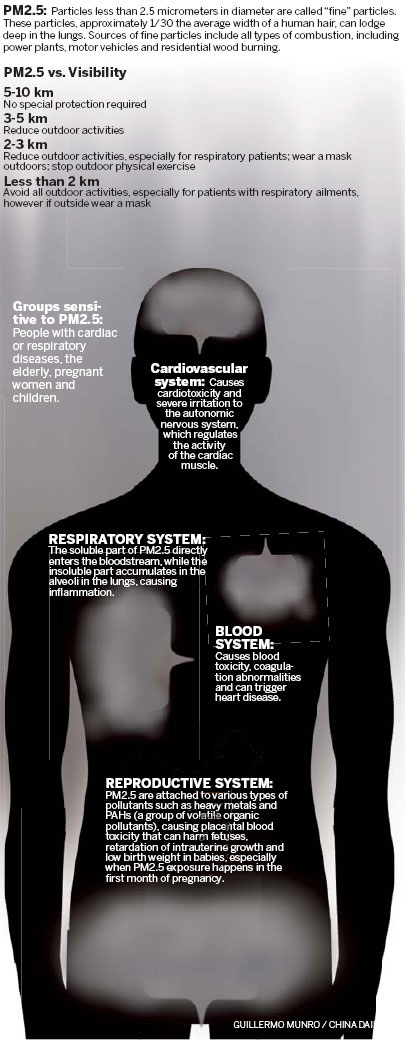
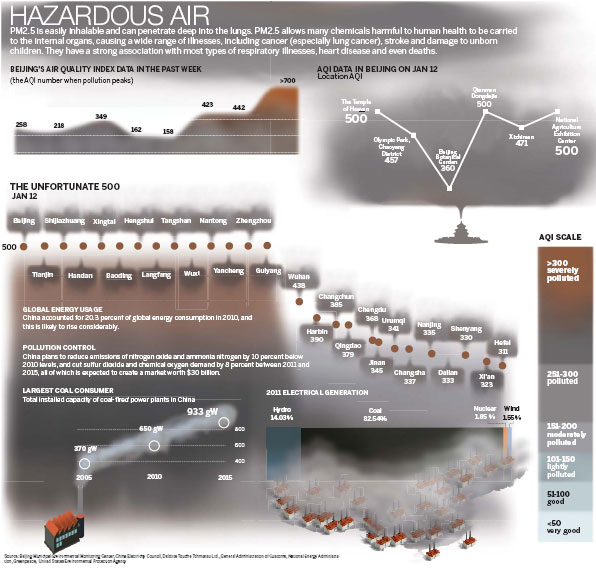
(China Daily 01/14/2013 page6)
